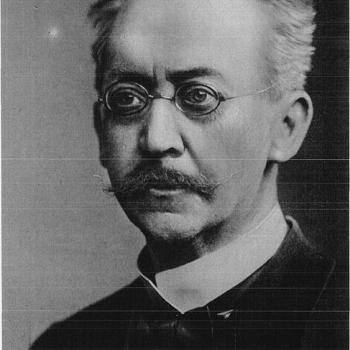
The following exchange was with an anti-Catholic Protestant named Douglas Mabry. The original debate had to do with the communion of saints, but the details of that are not my present concern. Rather, it is with the general principle of how misunderstandings are to be ascertained and corrected, and how people rationalize that they understand what they in fact do not understand at all (something that anti-Catholics habitually do when it comes to Catholicism). His words will be in blue.
I wrote one post in response to Mabry’s assertions. He persisted with the same argument and tired misunderstanding of mine, almost as if I hadn’t responded at all, and so I clarified matters again. All to no avail: Mabry came right back (“one last time” or “one final time,” so he sez) with truly ridiculous ad hominem attacks.
***
There is no need to go through all of Dave’s missive; there is really nothing new in his presentation.
Of course not. Translation: “I don’t know how to reply to Dave’s clarifications (without conceding the point altogether) and I can’t ever admit I’m wrong or uninformed with regard to a lowly Catholic and his stupid arguments, so I’ll play the game of pretending that there is nothing new here and that Dave merely babbles his arguments over and over, ad nauseam.”
He continues question begging and missing the point.
An excellent quick way to avoid the consequences of one’s own arguments: make sweeping statements about the other guy, utterly irregardless of their relationship to reality and the truth of the matter.
His post might be summed up thus: No one has understood his argument, least of all me; . . . Let’s go ahead and point out that Mr. Armstrong is not arguing for the “whole ball of wax” as he put it. What he is attempting is arguing for a logical foundation for the intercession of the saints.
Yeah, that would work, since it is the truth, and since I already did so myself.
That is the argument Dave has presented that he claims no one understands.
I never claimed (to my knowledge) that no one understood it: only that Mabry and Carrie and whoever else has made their wrongheaded comments on my argument do not accurately understand it. But the extreme exaggeration works well for the purpose of playing to the crowd, doesn’t it? That makes me out to be unreasonable and eccentric, rather than Mabry not comprehending my argument, as is actually the case.
When dealing with Dave Armstrong, it is important to remember that no matter how well one presents his argument back to him, there is a good chance that Dave will say that you never understood it.
This is downright delicious (and is the one statement that was absolutely beyond my power to resist — so pregnant with comedic possibilities was it; hence the present reply). Let’s see how this peculiar reasoning works:
1) Dave makes argument x.
2) John Doe argues in a way that makes it obvious to Dave that he didn’t properly understand argument x.
3) So Dave says that Doe has misunderstood x and goes on to clarify the proper understanding of x and exactly how Doe misunderstood x.
4) Doe comes back with the claim that Dave routinely makes the claim that people misunderstand his arguments.
5) At this point we must determine:
a) Does Dave simply say this as a tactic even though it is not true?
or
b) Is it actually true that Doe did indeed misunderstand argument x?
6) If 5a obtains, then Doe has to establish this extraordinary charge with some semblance of plausible evidence, rather than merely assert it, and that — it seems to me — would be rather difficult to do without returning to the argument itself and demonstrating it with rational argument. In effect, then, it simply forces him back to the argument where he should have been in the first place.
7) If 5b obtains, on the other hand, then it is beyond ridiculous for John Doe to complain that it is improper for Dave to claim that his argument x was misunderstood when in fact it truly was misunderstood. What?: is Dave supposed to pretend that his argument x wasn’t misunderstood when it actually was? Of what possible use would that be?
8) Moreover, 5b entails a scenario whereby Person B claims to understand Person A’s argument x better than Person A himself does, and that is manifestly absurd, for it is hardly possible for Person B to know more about the motivation and reasoning chain of Person A regarding A’s argument x than Person A knows.
9) Ergo: either way, Doe’s “reply” is utterly inadequate: it is groundless and completely lacking in any substance or force in scenario 5a and ludicrously absurd and self-evidently false in scenario 5b.
The rest of his post repeats things that I have already answered. Once that happens, you know your opponent is firing blanks (or a squirt gun, as it were).
I read something today in C. S. Lewis that perfectly describes the mentality that so many anti-Catholics display when “dialoguing” with Catholics:
You can invent a simpler proof, that is, a simpler concatenation of intuitable truths. But when you come to an absolute inability to see any one of the self-evident steps out of which the proof is built, then you can do nothing . . . the supposed inability is usually a refusal to see, resulting either from some passion which wants not to see the truth in question or else from sloth which does not want to think at all. But when the inability is real, the argument is at an end.
(The Weight of Glory, New York: Macmillan / Collier Books, revised and expanded edition, 1980, edited by Walter Hooper, New York: “Why I Am Not a Pacifist,” p. 35)
***
(originally 7-8-07; slightly abridged and revised on 3-21-18)
Photo credit: cropped version of a photograph by Geoffrey Fairchild (2-24-10) [Flickr / CC BY 2.0 license]
***













